The sentencing is in for Jason Spezza: He will be suspended six games for his knee to the head on Neal Pionk. Spezza will be appealing the decision.
Appeal coming for Spezza. First would be to Commissioner Bettman. If not satisfied with that ruling, option for independent arbitrator.
— Elliotte Friedman (@FriedgeHNIC) December 8, 2021
Jason Spezza and the Leafs made 3 arguments in suspension case:
1. It was not kneeing; NHL Player Safety disagreed.
2. Neal Pionk was eligible to be checked; NHL Player Safety agreed.
3. Spezza would have checked Pionk legally had he not fallen; NHL Player Safety disagreed.
— Jonas Siegel (@jonassiegel) December 8, 2021
In its video explainer, the league cites the “reckless and retaliatory” nature of the hit, the targeting of the head on a vulnerable player, and the fact that Pionk was injured on the play (Pionk took six shifts after the hit but was placed in concussion protocol earlier today).
Of course, trying to make heads or tails of the suspension length handed down by George Parros as compared to any number of violent incidents in the league over the past few seasons is a fool’s errand to begin with.
Just like with the Kadri suspension in Game 2 of the 2019 playoffs, it’s also not defending the player’s actions to say the league needs to acknowledge that its officials let the game spiral out of control, creating the kind of environment where players felt the need to take matters into their own hands. This context should also be considered to some degree in the punishment of the retaliatory act; the fact that Pionk had kneed Sandin shortly before Spezza’s hit is mentioned in the video above, but of course, the fact that what the league later deemed a suspendable offense went completely uncalled on the ice is not.
Simply assessing a punishment of his magnitude for the retaliatory act without acknowledging the glaring officiating errors that created a dangerous environment on the ice in the first place gets the league no further ahead in terms of advancing player safety. Of course, that appears to not actually be the aim of the NHL DoPS, which is just a damage-control operation that isn’t making its decisions based on anything that resembles objectivity, fair standards, or consistent principles.
It’s impossible to do a fair accounting of what happened on Sunday night without acknowledging the repeat patterns / cycles of failure the league perpetuates with the lack of officiating oversight. There should be real consequences for officials who blatantly miss a call on an attempt to injure that left a promising young NHLer like Rasmus Sandin with a potentially serious injury. A veteran player on the injured player’s team (Jason Spezza, who has zero history of this kind of behaviour) seeking out frontier justice is a natural consequence stemming from an egregious officiating failure.
In a vacuum, it makes sense to send a loud-and-clear message that the league won’t tolerate retaliatory head-targeting predatory hits such as Spezza’s, but the league is fooling nobody if it doesn’t acknowledge the officials’ role in creating the environment where players felt the safety of themselves and their teammates were in jeopardy. Brad Meier obviously shouldn’t be refereeing games right now without a proper review of Sunday’s officiating performance, but of course, he is currently calling a game in Detroit as we speak. And whether it starts by making refs available for questioning by the media or providing a similar mechanism of accountability that the NBA has implemented with its Last Two Minute Reports, something obviously needs to change with the officiating culture in the league.
To be frank, Jason Spezza should feel little remorse about what he did in the name of defending a young teammate. The most egregious offense came a few minutes earlier when the officials failed to do their job on an attempt to injure right in front of the net on a scoring play.


![Sheldon Keefe on the Maple Leafs’ struggling power play: “[We’ve scored] one out of 11 high-danger chances in tight to the net… We have been in those spots and haven’t converted” Sheldon Keefe, playoff press conference](https://mapleleafshotstove.com/wp-content/uploads/2024/04/keefe-pc-game-3-218x150.jpg)
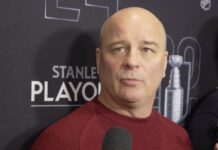
![Jim Montgomery Post Game, Bruins 4 vs. Leafs 2: “[Marchand] still manages to get under people’s skin, yet he doesn’t cross the line” Jim Montgomery, Boston Bruins post game](https://mapleleafshotstove.com/wp-content/uploads/2024/04/jim-monty-pg-to-218x150.jpg)
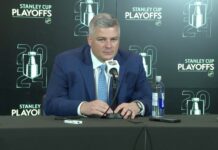
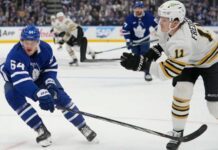




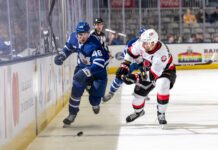


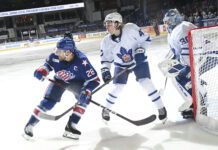










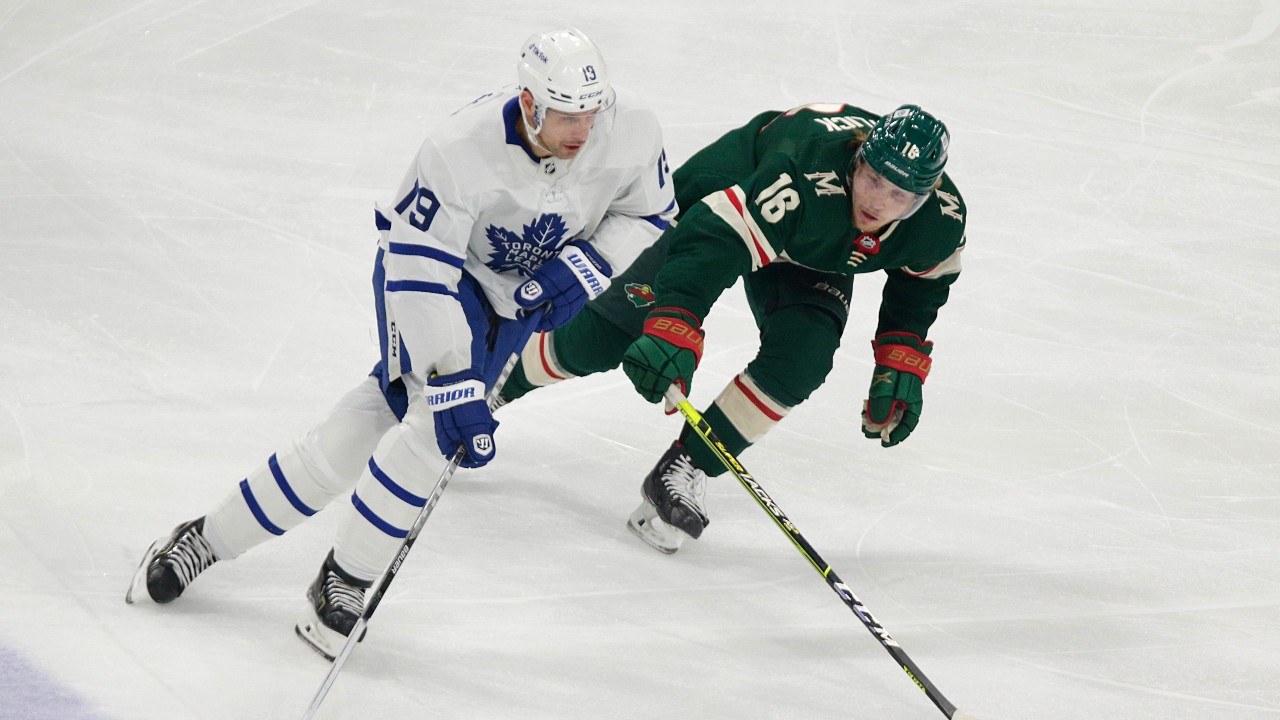


![Sheldon Keefe on the Maple Leafs’ struggling power play: “[We’ve scored] one out of 11 high-danger chances in tight to the net… We have been in those spots and haven’t converted” Sheldon Keefe, playoff press conference](https://mapleleafshotstove.com/wp-content/uploads/2024/04/keefe-pc-game-3-100x70.jpg)



![Jim Montgomery Post Game, Bruins 4 vs. Leafs 2: “[Marchand] still manages to get under people’s skin, yet he doesn’t cross the line” Jim Montgomery, Boston Bruins post game](https://mapleleafshotstove.com/wp-content/uploads/2024/04/jim-monty-pg-to-100x70.jpg)

